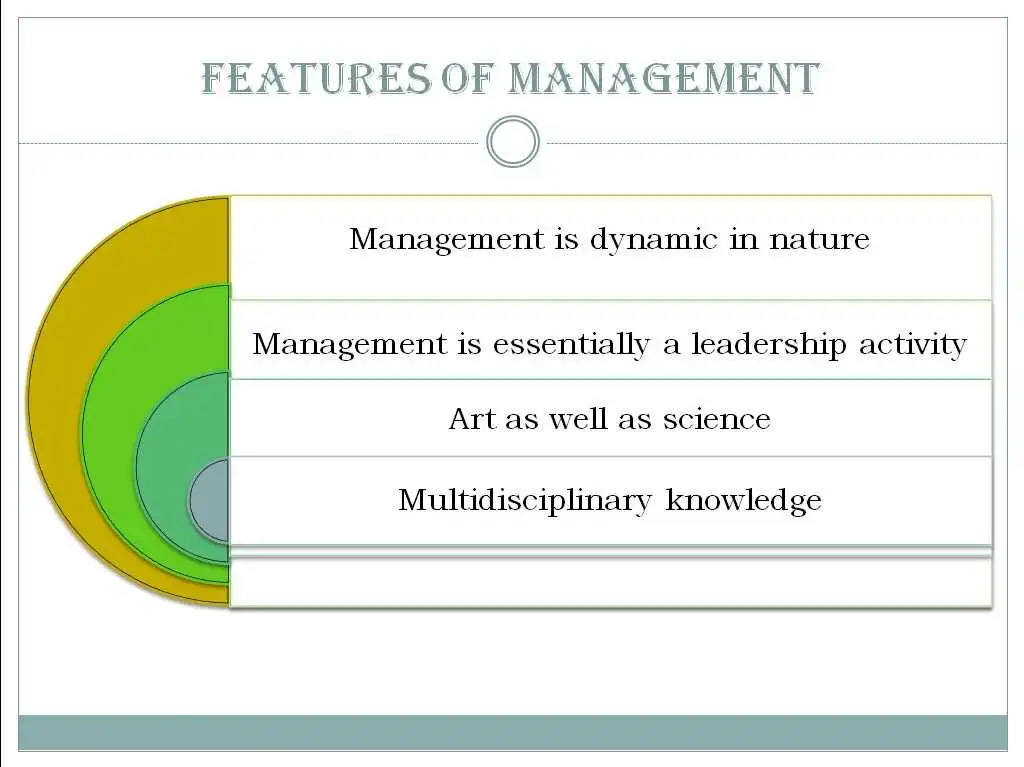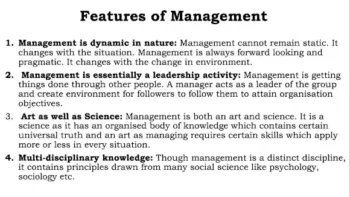Table of Contents:-
- Features of Management
- Objectives of Management
Features of Management
After studying some definitions, we came to know some elements that we call the basic features of management.

1. Management is a purposeful process
Every organization has some basic objectives which are the reasons for its existence. The objectives should be simple and clear. The objectives of each organization are different.
For example, the objective of a retail shop may be to increase sales but the purpose of ‘The Spartacus Society of India’ is to provide education to children with special needs. Management binds the efforts of different people in the organization in a single thread to achieve these objectives.
2. Management is omnipresent
Whether the organization is economic social or political, the activities of management are the same in all. Proper management of a petrol pump is equally vital, similar to the management of a hospital or a school. The work of managers in India will be the same as that of the managers in the USA, Germany, or Japan. How he does these may vary. The difference in work may also be due to the differences in their culture, customs, history or more.
3. Management is multidimensional
Management is a complex activity that has three major dimensions, which are as follows-
(a) Management of work – The fundamental role of any organization is to engage in productive activities. A manufacturer manufactures in a factory, a clothing store caters to a customer’s needs, and a hospital treats a patient. Management converts these tasks into attainable objectives and determines the ways to achieve these objectives. These include – solving problems, decision making, planning, budgeting, fixing responsibilities, and delegation of authority.
(b) Management of people – Human resources i.e., people are the biggest asset of any organization. Even after the improvements in technology, getting people to work is still the main task of the manager.
There are two aspects of people management-
(1) It treats employees as individuals with different needs and behaviours.
(2) It treats people as a group. Management makes people work towards achieving the objectives of the organization by making their strengths effective and making their weaknesses irrelevant.
4. Management of Operations
Whatever the organization, its existence depends on providing some original product or services. This requires a production process that regulates the flow of input goods and technology to convert the inputs into the outputs required for consumption. It is concerned with both the management of work and the management of people.
5. Management is a continuous process
The management process is a series of continuous, cohesive but separate functions (planning, organization, directing, appointing, and controlling). All the managers always perform these functions simultaneously. You must have noticed that at Fabmart, Suhasini does many different tasks in a single day. Some days she spends more time planning future exhibitions and on other days she is engaged in solving the problems of the employees. A series of tasks are coordinated in the functions of a manager, which is continuously active.

6. Management is collective action
An organization is a group of different types of people with different needs. Every person in the group joins the organization for some different purpose but as a member of the organization, they work for the fulfilment of the common objectives of the organization. This requires working as a team and co-ordination of individual efforts in the same direction. Along with this, management makes it possible for the members to grow and develop according to the change in needs and opportunities.
Related Article: Limitations of Management
7. Management is a dynamic function
Management is a dynamic function and it has to be adapted to the changing environment. The organization comes in contact with the external environment, which includes various social, economic, and political elements. Normally, the organization has to change itself and its objectives according to the environment. You are probably aware that McDonald’s, the giant of the fast-food sector, has made drastic changes in its food list to survive in the Indian market.
8. Management is an intangible force
Management is an intangible force that is not visible but whose presence can be felt in the form of the functions of the organization. The effect of management in the organization is realized in the form of arrangement instead of happy and satisfied employees, and achievement of goals according to plans.
9. Management is a Group Effort
Management always gives importance to efforts. It does not apply to an individual but refers to the planning, direction, organization, and control of the efforts of a group. So Koontz and O’Donnell called “Formally Organized Groups”, “Laurence Appleey “Efforts of Other People”, Heyn and Massey called “Cooperative Groups”, Reynolds called “Efforts of Other People”. The words “Agency of Community” etc. have been used. Management is said to be a system of collective efforts because the goals and objectives of the organization can be achieved more easily and effectively by a group than by an individual.
Objectives of Management
The administrators work to accomplish certain objectives of management. Objectives are the expected results of any action. These should be obtained from the original purpose of the business. Each organization has different objectives and the management has to accomplish all these objectives effectively and efficiently.
Objectives of Management are as follows:
Organisational Purpose
Management is expected to work for the achievement of the objectives of the particular organisation in which it exists. Organisational objectives include:
i) Reasonable profits to give a fair return on the capital invested in the business.
ii) Survival and solvency of the business, i.e., continuity.
iii Growth and expansion of the enterprise.
iv) Improving the goodwill or reputation of the enterprise
Personal Purpose
An organisation consists of several persons who have their objectives. These objectives are as follows:
i) Fair remuneration for work performed.
ii) Reasonable working conditions,
iii) Opportunities for training and development
iv) Participation in management and prosperity of the enterprise.
v) Reasonable security of service.
Social Purpose
Management is not only a representative of the owners and workers but is also responsible to the various groups outside the organisation. It is expected to fulfil the objectives of society which are as follows:
i) Quality of goods and services at a fair price to consumers.
ii) Prompt and Honest payment of taxes to the government.
iii) Conservation of environment and natural resources.
iv) Fair dealings with dealers, suppliers, and competitors.
v) Preservation of ethical values of the society.
Organizational objective
Management is responsible for setting the objectives for the organization and fulfilling them. It has to achieve many types of objectives of all sectors and has to keep in mind the interests of all the stakeholders like shareholders, employees, customers, government, etc. The main objective of any organization should be the use of human and material resources to the maximum possible benefit. Which means fulfilling the economic objectives of the business. These objectives are to survive, earn profit and grow.
Growth
A business needs to increase its prospects in the long run. For this, the growth of the business is very important. To survive in the industry, management must take full advantage of the potential for organizational growth. Growth of business can be measured in terms of sales turnover, increase in the number of employees increase in the number of products or investment of capital, etc.
Existence
The basic objective of any business is to maintain its existence. Management should make efforts towards the survival of the organization. For this, the organization should earn enough money to meet the costs.
Related Article: Importance of Management
Profit
It is not enough for the business to survive. Management has to ensure that the organization makes a profit. Profit serves as an important impetus for the continued successful operation of the enterprise. Profit is necessary to meet the costs and risks of the business.
Personal purpose
Organizations are made up of people who have different personalities, backgrounds, experiences, and objectives. All of them become a part of the organization to satisfy their various needs. These vary from financial needs like competitive salary and other benefits to social needs like recognition by peers and higher-level needs like personal growth and development. Management has to match the individual objectives with the organizational objectives for coordination in the organization.
Social purpose
To create benefits for society. Organization whether commercial or non-commercial, being a part of society, has to fulfil certain social obligations. It means creating favourable economic values for different sections of society. This includes adopting different methods of production, providing employment opportunities to the deprived sections of society, and providing facilities like schools, and churches for the employees. The next box gives an example of an organization fulfilling Corporate Social Responsibility.
To Achieve Pre-Determined Objectives
According to Theo Hamann – “Effective management is always “Management by Objective”.
According to Haynes and Massey – “Management without objectives would be impossible if ever.”
Thus, under management, the efforts of the group are directed towards the attainment of pre-determined objectives by the organization and the success of the management depends upon the achievement of these objectives or goals.
You May Also Like:
Roles and Responsibilities of HR Manager
